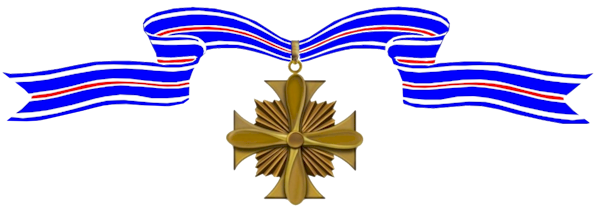The President of the United States of America takes pleasure in presenting a Gold Star in lieu of a Second Award of the Distinguished Flying Cross to Petty Officer Jason A. Shepard, United States Coast Guard, for extraordinary achievement while participating in aerial flight from 30 August to 2 September 2005 during Hurricane Katrina rescue operations in metropolitan New Orleans. Demonstrating exceptional skill and superlative physical stamina, Petty Officer Shepard served as Rescue Swimmer aboard HH-65 and HH-60 helicopters flying repeated sorties in an urban disaster environment. On 30 August, Petty Officer Shepard and his crew located a couple and their six-month-old baby trapped atop a car and in imminent danger from rising flood waters. Recognizing the danger of the rotor wash blowing them into the toxic waters, he harness-deployed from 80 feet to the roof of an adjacent home and made a daring 12-foot vertical leap to the submerged vehicle’s hood, where he narrowly avoided slipping into the toxic waters. Using extraordinary strength and agility, he maintained his footing, tended the basket and repositioned the family onto the roof for rescue. While his aircraft shuttled the family to a collection point, Petty Officer Shepard observed literally hundreds of survivors stranded on surrounding roof tops. With heroic perseverance and complete disregard for his own safety, Petty Officer Shepard swam from house to house through the floodwaters, navigating jagged debris and industrial waste. Upon reaching the flooded homes, he fought his way through tangled debris, sometimes scaling walls to climb his way to each rooftop to reach survivors. As a roof was cleared of survivors and his helicopter in transit to drop them off, Petty Officer Shepard returned to the water and repeated this arduous and extremely dangerous cycle. Later, he deployed to a levee to treat a patient with arterial bleeding who was on the verge of death. Adding to the mayhem were 200 volatile and bewildered survivors surrounding him and demanding evacuation. In order to subdue the crowd, he directed the most hostile evacuees to assist with care of critical survivors, turning their aggression into a constructive task, and quickly deescalated the situation. Without Petty Officer Shepard’s ability to deal with the life-threatening injuries while simultaneously controlling a nearly riotous crowd, the victim would have surely died. Petty Officer Shepard’s actions, aeronautical skill and valor were instrumental to the rescue of 62 storm victims. His courage, judgment, and devotion to duty are most heartily commended and are in keeping with the highest traditions of the United States Coast Guard.

Awards Received
-

Distinguished Flying Cross
-
Distinguished Flying Cross
Service:
United States Coast GuardRank:
Petty OfficerAction Date:
December 12, 1996
Citation Courtesy of the Distinguished Flying Cross Society – www.dfcsociety.orgThe President of the United States of America takes pleasure in presenting the Distinguished Flying Cross to Petty Officer Jason A. Shepard, United States Coast Guard, for extraordinary achievement while participating in aerial flight on the evening of 12 December 1996 as Rescue Swimmer aboard Coast Guard HH-60J helicopter 6018. Petty Officer Shepard was engaged in the search and rescue of two survivors from the Fishing Vessel Oceanic, which sank 20 nautical miles west of Craig, Alaska after encountering mechanical problems in heavy seas. Helicopter 6018 was diverted from training and returned to Coast Guard Air Station Sitka to load specialized rescue equipment. Although wet and cold from multiple training deployments, Petty Officer Shepard volunteered to stay with the original crew for the rescue sortie. En route, Petty Officer Shepard maintained communications as the helicopter flew 112 miles through gale force winds and near-zero visibility in dark, icy conditions and severe turbulence. Once on scene, Petty Officer Shepard diligently searched the massive 20-foot seas for 40 minutes, remarkably located three persons floating in the frigid 38-degree water. Two of the victims wore survival suits and a third clung to a life ring. Initial hoist attempts using the rescue basket were thwarted by the violent winds and seas, which blew the basket wildly away from the survivors. Petty Officer Shepard selflessly donned a direct deployment harness and was lowered into the churning seas only to be swept from the survivors on multiple attempts. Eventually, two survivors were safely hoisted using the basket and a high hover technique, but a third motionless victim remained in the water. With fuel below safe levels, Petty Officer Shepard intrepidly volunteered to be lowered again. Battling massive seas, Petty Officer Shepard reached the unresponsive victim, but despite a Herculean effort, was unable to get the victim aboard the helicopter. Now critically low on fuel, helicopter 6018 had to depart scene for the nearest landing site and medical care. Petty Officer Shepard administered first aid to the hypothermic survivors and prepared the cabin for possible ditching to the rocky shoreline due to fuel starvation. Helicopter 6018 reached the safety of Klawock Airport with just five minutes of fuel remaining. The two survivors were transferred in stable condition to awaiting ambulances. Petty Officer Shepard’s actions, aeronautical skill, and valor were instrumental in the rescue and full recovery of two survivors who would have otherwise perished. His courage, judgment, and devotion to duty are most heartily commended and are in keeping with the highest traditions of the United States Coast Guard.

